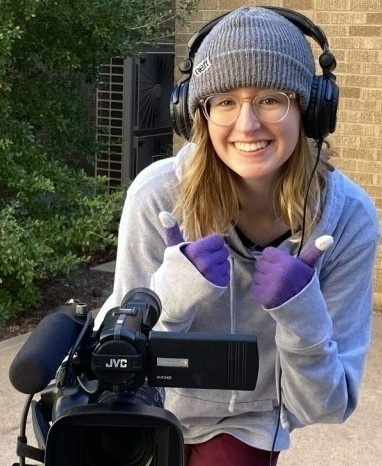Woman celebrates freedom from painful periods after minimally invasive procedure


Issy Birsinger was a sophomore in college when she underwent excision surgery at Texas Children's Hospital Pavilion for Women for endometriosis, a painful disease that had invaded her uterus, ovaries and lower digestive system.
“At one point, things were so bad I wondered if I was ever going to be able to do anything with my life,” said the now 21-year-old graphic arts student.
She credits her faith, her family and friends, and her surgeons Dr. Xiaoming Guan and Dr. Brooke Thigpen with the Center of Excellence in Minimally Invasive Gynecology at Pavilion for Women, for getting her through her journey. “Drs. Guan and Thigpen basically saved my life,” Issy said.
“I think one of the biggest misconceptions about endometriosis is that it only affects older women. When I tell someone I have this disease, they all say the same thing – but you’re so young!”
Despite the toll endometriosis took on her physically, mentally and emotionally, today she finds herself thankful for what she learned and for the opportunity to share her story. “I think one of the reasons we go through suffering is to help other people and encourage them,” she said.
Issy’s message to young women who think they may have endometriosis: go to a specialist. “I went through a bunch of doctors who said everything was fine. You know your body,” she emphasized. “If it feels like something isn’t right, keep looking for someone who will listen to you.”
“I knew early on that my periods weren’t like what my friends experienced. Their cramps were painful. Mine were at a different level. I was a competitive dancer, with a pretty high pain tolerance and a disciplined body, but my periods still prevented me from doing so many things.”
Finally, an OB/GYN told her she might have endometriosis. It was the first time she had heard of the condition. She decided to try natural supplements to lower her estrogen levels. “I don’t know if it was the supplement or just the grace of God, but during my freshman year of college I hardly had any pain and was able to live a normal life,” said Issy. “But later that year, the pain was back and got increasingly worse.”
“Endometriosis is a complex disease that can lead to a wide range of painful symptoms that impact a patient’s quality of life,” said Dr. Guan, who is also a professor and division chief of minimally invasive gynecological surgery in the Department of Obstetrics and Gynecology at Baylor College of Medicine. “While this disease is incredibly common, unfortunately it’s often misdiagnosed.”
She missed a lot of school, especially during her period. “It got so bad, I asked my professors if I could take my finals a week early, because they coincided with my period. The month before, my friends had to take me to the ER during my period. I didn’t want to put them through that on finals week.”
Desperate for help, she went back to the gynecologist, who recommended surgery. Issy’s mother suggested they see a specialist. “That’s how we found Dr. Guan, and I’m so glad we did,” said Issy. “When I told him everything I’d been through, he said that sounds really bad and it sounds like endometriosis. Let’s do an endometriosis MRI.”
Her history, symptoms, and pelvic MRI were consistent with endometriosis, and Dr. Guan performed robotic excision surgery. During this surgery, they removed endometriosis in multiple areas surrounding her uterus, ovaries, colon and rectum. A colorectal surgeon was also on standby in case there was extensive endometriosis involving the bowel. “Even though we ended up not needing him, I really appreciated Dr. Guan having him there,” noted Issy.
“I also appreciate how much time this team spends with their patients. When a doctor sits down and converses with you as a person and really listens to you, it’s so helpful.”
“Often times our patients are seen by many other providers and have shared that previously their symptoms have been dismissed, therefore it’s so important that I listen and hear their story,” said Dr. Thigpen. “Every experience with endometriosis is different in how in effects someone and their quality of life, so I really aim to make that personal connection and work to find a solution for them.”
After surgery, Issy took a semester off to heal.
While it delayed her graduation date, the recovery time was beneficial to her health and well-being, said Issy. “I grew a lot in my faith and in my relationships throughout this experience. My faith definitely got me through the worst times, just knowing there is a God who loves me and who is good even during the worst of times. This experience proved that to me.”
“Endometriosis also taught me the importance of bringing people in when you’re hurting. I don’t like admitting I need help. But I learned the people who love you really want to help you. Even if all they can do is sit on the floor next to you while you cry, because even the highest level of pain medication isn’t helping. My parents did that, and it meant the world to me.”
As an art student, working on her craft has also been healing, she added. “After everything I’ve been through, I’d love to use my art to support others, and just be a light in dark places.”
“Since my surgery, my period has just gotten better and better. Sometimes I have no pain at all, and even when I do it's not crippling and can be easily treated with a single dose of Tylenol.,” said Issy. “It’s been so amazing.”
Texas Children’s Pavilion for Women has earned accreditation as a Center of Excellence in Minimally Invasive Gynecology. For more information on the conditions treated and the procedures offered, click here.




